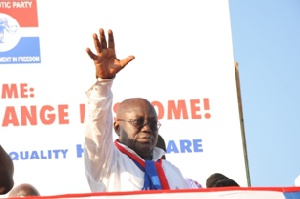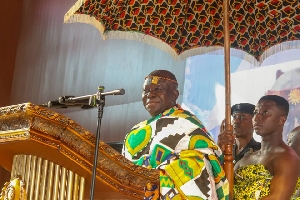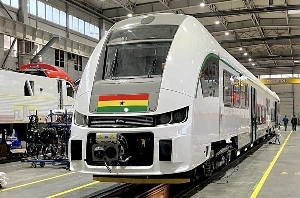- Home - News
- TWI News | TV
- Polls
- Year In Review
- News Archive
- Crime & Punishment
- Politics
- Regional
- Editorial
- Health
- Ghanaians Abroad
- Tabloid
- Africa
- Religion
- Election 2020
- Coronavirus
- News Videos | TV
- Photo Archives
- News Headlines
- Press Release
General News of Wednesday, 5 December 2012
Source: DaMina
NPP tipped for First round victory
With four days before polls open in Ghana, Africa’s most competitive democratic state, DaMina Advisors reiterates its August statistical forecast that the opposition center right New Patriotic Party (NPP) is on course to likely win about 52% in a first round vote clincher and defeat the ruling center-left National Democratic Congress (NDC), after only one term in office.
The NDC won the 2008 elections by just 40,000 votes out of almost 9 million cast. (In 2008, the model correctly forecasted the NDC narrow victory). On Friday December 7, according to two statistical models, which are reproduced below, the opposition is poised to win by a margin of over 400,000 votes and regain power.
While the ideological gap between the two parties is fairly narrow, a win by the opposition will usher the country into a US-style free high school education system – the central plank of the bourgeois party’s surprising populist platform. The ruling center-left NDC despite the advantages of incumbency, and a strong media campaign in recent weeks is plagued by strong internal centrifugal disagreements between party and government elites and the charismatic party founder, former President Jerry John Rawlings.
These dis-uniting tendencies have dented President John Mahama’s ability to maximize his incumbency advantages and cast a shadow over Mahama’s otherwise savvy media campaign. The NDC is therefore on track to lose the first round vote and return to the opposition benches in 2013. The country’s minor opposition parties are not likely to win not more than about 2% of the vote. If they do so, they will take most about 1% each from both the ruling NDC and opposition NPP, without significantly altering the outcome of the race.
Earlier in August, DaMina Advisors published a Ghana elections forecast - Model 1, based on the best available data at the time – Ghana’s 2010 census data. Over the past month, the country’s national Electoral Commission has released the final voter registration numbers. DaMina Advisors has therefore revised Model 1 by plugging in these new figures to make Model 2 statistically more robust.
Of note, while the difference between the census data and the published national voter register was only 3%. Now that the campaigns have ended, DaMina has also revised slightly its forecasts for expected voter turnout in key regions on Friday – particularly in the capital area, Accra. DaMina has also revised the party vote share forecasts for a number of critical regions – Ashanti, Volta, Northern, Upper East, Brong Ahafo and Central to reflect the current state of the race.
With all these statistical revisions done, the outcome of the race is still essentially the same – as DaMina Advisors forecasted in August, 2012 – a likely 52%/ 53% win for the opposition NPP and a likely 47%/ 48% loss for the ruling NDC.
This is despite the fact the NDC receives a net 200,000 votes from the published 2012 official voter registration list. This discrepancy issues from the fact that while the 2010 census data showed the Ashanti region to have the most populous adult population, the 2012 national electoral register pegs the number of registered adults in Greater Accra as higher than in Ashanti region. The NDC, which has historically had a stronger base in Accra therefore benefits from this change. However a net 200,000 voters notwithstanding, the NDC is still on track to lose the first round vote on December 7.
While different campaign strategies, messages, manifestos, media campaigns, innuendoes, fistfights, online ads, media smear pieces, election year goodies to voters and many other normal campaign paraphernalia may have slightly altered the overall perceptions of candidates in Ghana, the most in-depth objective non-Ghanaian academic studies conducted by Professor Kevin Fridy at the University of Tampa shows that after 20 years of democracy surprisingly no meaningful influence of age, educational background, sex or ideology appears to affect Ghanaians in how they form their voting preferences.
Unlike in highly literate advanced democracies where ideology and economic class plays a decisive factor in voter preferences, in Ghana just like in many other African democracies, where the pre-election campaigning seeks to mobilize voters along ethno-tribal lines, most Ghanaian voters form their voting preferences along those primordial tribal and ethno-cultural lines – negating the effects of western style electoral tools.
While some of the populations in Ghana’s regions such as Central, Western, Brong Ahafo and Greater Accra serve as marginal swing voters, the vast majority of Ghanaians vote just like their parents, along well established ethno-tribal lines. Turnout in the various regions is therefore the key to presidential electoral success in Ghana. In coming decades as Ghana’s economic classes become more stratified and urbanization deepens, the ethno-tribal tendency in the voting patterns will ultimately decrease.
Overall national turnout has increased since 1992, peaking in 2004 and declining somewhat since then. DaMina estimates 2012 turnout will be about 71%, with most regions voting just slightly above or below their historic turnout rates since 1992 (see Model 1 and 2 for details). Both our two models – one based on the 2010 census data and another based on the just published 2012 electoral role – yield the same outcome, a very strong likelihood of an opposition NPP victory on December 7.
If, however, the smaller minor parties do much better than projected 1%, the election will head into a second round, where the chances of the incumbent NDC are much stronger than the opposition NPP as it will have more resources to mobilize its base voters, while the opposition scrambles for resources to mount a second campaign











